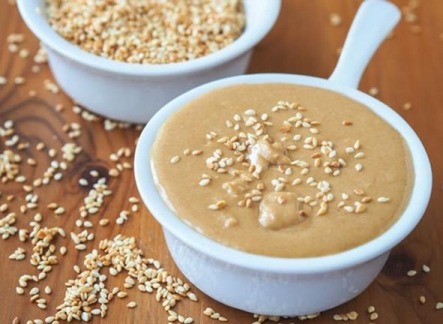Tahini: what it is, recipe and benefits of tahini
Tahini is a delicious sesame seed paste, full of benefits and properties. Find out how to make it at home with this traditional recipe.
Oriental cuisine, especially Indian cuisine or Turkish cuisine highlights to bequeath with a whole range of wonderful recipes and dishes where some legumes, nuts and spices are constituted as the main ingredients. Therefore it becomes a tremendously aromatic delicious cuisine, where the slightly spicy flavors are extremely characteristic.
It is made by grinding sesame seeds, also known as sesame, which is emulsified with oil and water until you get a creamy paste with a very pronounced flavor. In turn, they can be prepared simply with water because the seeds are oily.
That is, it is basically a paste made from sesame seeds, which are ground and emulsified with different ingredients, particularly olive oil and/or water. These pastes is commonly add crushed garlic cloves, lemon juice, freshly squeezed and finely chopped parsley, although these last three ingredients are optional.
Depending on the place in the world where we are can become a condiment (is an essential ingredient in the development of the hummus and eggplant puree), or directly eaten with bread (especially with pita bread). In Turkey, for example, it is also used in the preparation of a winter nutritious breakfast where tahini is mixed with a sweet syrup typical cuisine of the Eastern Mediterranean and known by the name pekmez.
How to make tahini
You see the preparation of this oriental traditional food really is as easy as a simple. We set forth below the ingredients you need and the steps to follow for processing at home.
Ingredients:
- 3 tablespoons sesame seeds
- 4 tablespoons olive oil or water
- A little bit of salt.
Preparation of tahini
If sesame is not toasted we should toast it ourselves. For this first rinse thoroughly sesame seeds under running cold water, then drain it. Now put the seeds and place in a large skillet over medium heat for a few minutes, until you see that the seeds are browned slightly.
You can also roast the seeds in the oven. For this you place them on a baking sheet and heat for 8 minutes at 180°C. Once they toasted let cool slightly.
Now place the sesame seeds in a blender or an electric grinder. Add olive oil or water and sting everything very well. Repeat the process until you get a smooth paste.
Ready! It serves as desired in a small bowl and enjoy!
The benefits of tahini
If we consider that the tahini is made from cooked and grinding sesame seeds, there is no doubt that we are faced with a highly nutritious food, at the same time healthy.
From a nutritional point of view it is famous for its high content of B vitamins, especially vitamin B6 and vitamin B12. As surely you know these vitamins are essential for our nervous system as well as for cell tissue regeneration.
It also provides interesting amounts of zinc, an essential mineral for men’s reproductive health. Among the minerals and trace elements that we can mention also it provides phosphorus, magnesium, iron and calcium.
That itself is a very energetic food: 100 grams provide around 595 kcal.
Tahini is an extremely rich in unsaturated fats. In fact, it contains around 50% of this type of fats, which help to reduce the high levels of cholesterol, especially LDL or bad cholesterol. Among these unsaturated fats we found lecithin, in fact providing more lecithin than soybeans.
On the other hand it promotes proper digestion of fats, very useful to prevent arteriosclerosis.
Tahini is not only beneficial to lower cholesterol but it is very good for our cardiovascular system, especially for our heart, thanks to its contribution in unsaturated fat and provides essential fatty acids such as oleic acid (monounsaturated fat) and linoleic acid (polyunsaturated fat).
The tahini also brings interesting amounts of fiber, so it becomes a wonderful food not only useful to improve digestion of fats, but to prevent constipation (or treat naturally) and regulates intestinal transit.
